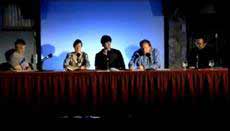|
 Theater of War |
That is the title character in Ajax, a tragedy written by Greek playwright and former general, Sophocles, 2,500 years ago. It recounts the story of Ajax, a fierce Greek warrior who slips into a crazed depression near the end of the Trojan War, attempts to kill his commanders, then takes his own life.
|
 'Theater of War' readings are designed to promote frank discussion about post-traumatic stress disorder and other psychological effects of war. |
Today, many doctors would say Ajax shows classic symptoms of Post Traumatic Stress Disorder," or "PTSD," an acute anxiety response often triggered by witnessing or experiencing intense or prolonged fear, helplessness or horror.
The US Department of Veterans Affairs says that up to 20 percent of American troops returning from Iraq suffer from PTSD. Almost every day someone in the military commits suicide.
"We perform them for only one reason," says Doerries, "and that is to inspire a conversation that would not otherwise be possible. People see themselves and their own stories reflected in an ancient narrative and they realize they are not alone, they are not alone in the room, they are not alone in the country, they are not alone across time. It gives people a sense of their own struggles in a much longer and larger view. So at the core, we want people who feel less alone to actually acknowledge what they are going through, and see that seeking help not as sign of weakness, but a sign of strength."
Inspiring conversation
|
 Brig. Gen. Loree Sutton talks of the high suicide rate in the military, saying they are averaging "almost a suicide a day." |
The "Ajax" story offered both revelation and relief to Army Maj. Joseph Geraci, who felt that the gore and glories of battle bind all warriors together.
"It's like we don't even need words," says Geraci. "All you need is to look in a veteran's eyes - be it an Iraq, Afghanistan veteran, a veteran of the Gulf War, from Vietnam, from Korea, World War II, a veteran from the ancient Greek wars. We're all connected at a very deep level."
One vet seems visibly moved, even shaken, when he asks to take the microphone. He says he identifies with Ajax and his rage "... and just not knowing what you're doing and just blacking out and waking up in another time and place and not realizing what happened."
Cathartic voyage
Sophocles' play features a "chorus" which personifies the soldiers Ajax led. They are devastated by the ruined man he has become.
For Adam Driver, the actor playing this part, Theater of War has been far more than a professional gig. It's been a cathartic voyage back to the pain and helplessness he often felt as an enlisted marine.
"I've definitely seen my sergeants and corporals, people I thought were stellar marines who later...get involved into drugs and they just crumble. And you feel powerless."
In contrast, says Brian Doerries, Theater of War's open discussion format allows enlisted personnel to speak frankly about themselves in the presence of their superiors and to be heard without fear and, just as important, it allows officers to listen to subordinates without the burden of military authority.
"One thing that theater uniquely can do is dissolve hierarchies," he says. "Now the hierarchy of the army doesn't dissolve forever. It dissolves for a moment because of the theatrical production. Something magical happens. And it's an important thing to have happen in a community that needs to heal."
That community also includes the loved ones of those coming home from war. An officer in the audience said his own son's experience was mirrored by the character of Ajax's son, seeing his father return from the Trojan war as a madman. A veteran's wife reported feeling that her husband had dragged the carnage of battle right into their home.
But the burdens of war cannot be just for warriors and their families to bear. Bryan Doerries says that just as society is responsible for sending its soldiers to fight, we must all take responsibility for helping them heal.
In that sense, he says, the Ajax tragedy and "Theater of War" are a wake-up call.
cathartic: providing psychological relief through the open expression of strong emotions(情感宣泄的,精神凈化的)
carnage: the violent killing of a large number of people(大屠殺)
'Family talk' heals old civil war wounds in rural Sierra Leone
Relocation trauma could be reduced
Pets2Vets Group is helping soldiers deal with stress disorder
Telephone line helps returning servicemen readjust to civilian life
(來(lái)源:VOA 編輯:陳丹妮)
